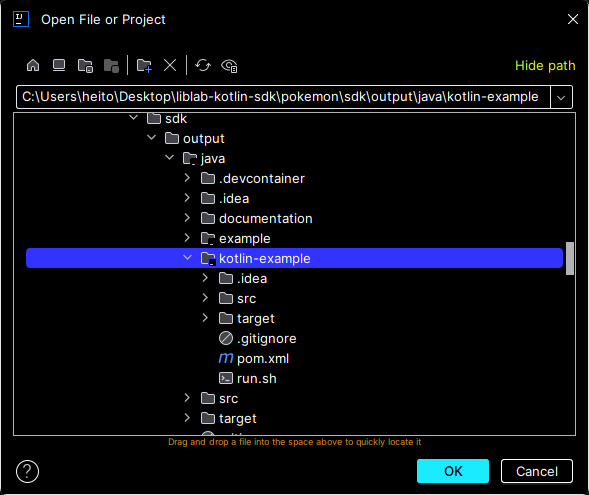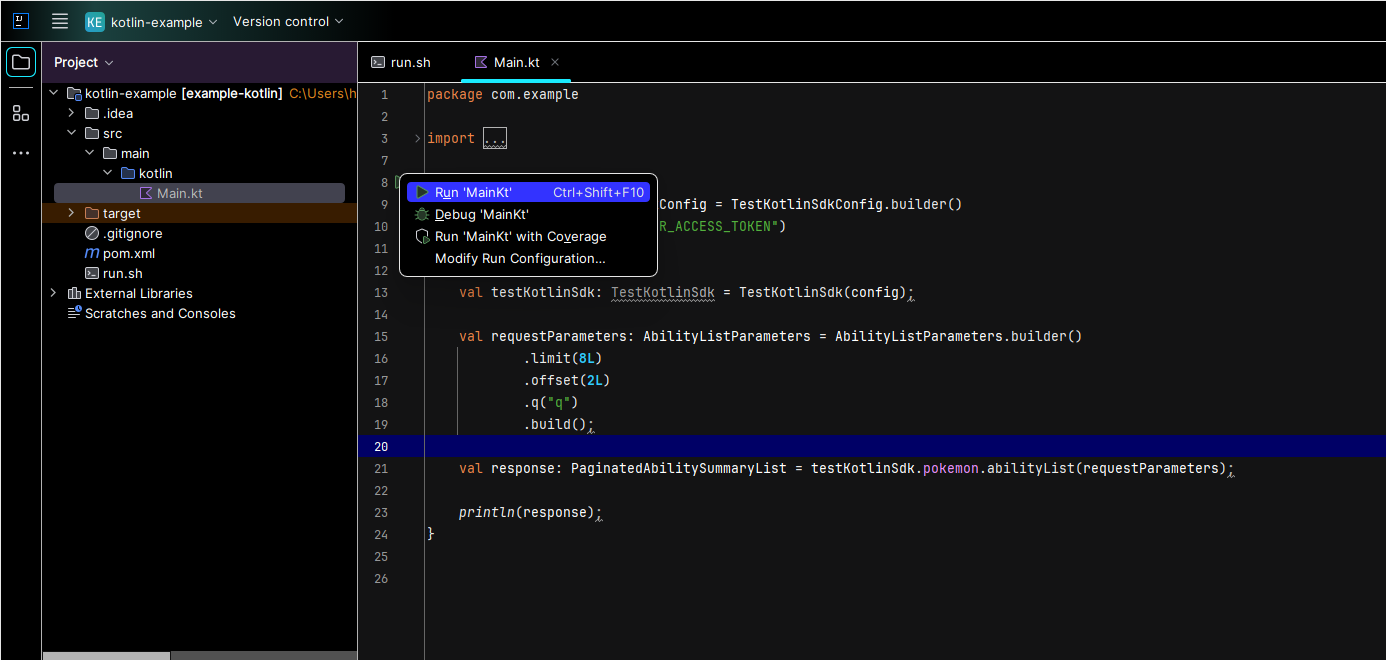How to generate and use a Java SDK in Kotlin
Supported SDK languages:
| TypeScript / Javascript | Java / Kotlin | Python | C# | Go | PHP |
|---|---|---|---|---|---|
| ❌ | ✅ | ❌ | ❌ | ❌ | ❌ |
liblab generates Java SDKs that are fully compatible with Kotlin.
SDKs simplify the developer experience by encapsulating API features into accessible functions, avoiding direct API complexities and streamlining integration.
Kotlin's modern design and seamless Java interoperability make it an excellent development choice, while IntelliJ IDEA offers robust tools to support Kotlin projects.
This tutorial shows how to import and use liblab’s Java SDK in Kotlin projects with Maven and IntelliJ IDEA.
Before getting started you'll want to make sure you have a liblab account and the liblab CLI installed.
You'll also need:
- Maven version 3.6 or higher installed.
- IntelliJ IDEA. You can use the Community Edition, which is free and open source.
Configure liblab
Start by setting up a liblab project so you can generate the SDK. Follow the steps to create and configure the liblab project.
Create a folder for the SDK project:
mkdir -p kotlin-sdk
cd kotlin-sdk
Initialize the liblab CLI in this folder by running the following command. This will create a file called liblab.config.json:
liblab init
Then update the configuration to:
- Change
"specFilePath". This tutorial uses the PokéAPI spec, but you can use your own API. - Produce Kotlin snippets in the docs.
- (Optional) Set the output SDK language to only Java.
- (Optional) Update the SDK and API names.
liblab config specFilePath "https://raw.githubusercontent.com/PokeAPI/pokeapi/refs/heads/master/openapi.yml"
liblab config languageOptions.java.includeKotlinSnippets true
liblab config languages "java"
liblab config sdkName "kotlin-sdk"
liblab config apiName "kotlin-sdk"
Explore the configuration documentation to discover the available settings and enhancements.
Generate the SDK
With the configuration set, generate the SDK using the following command:
liblab build -y
The liblab CLI will validate the configuration, OpenAPI specs, and build the SDK. You should see output like:
✓ No issues detected in the liblab config file.
No hooks found, SDKs will be generated without hooks.
⚠ Validation succeeded with warnings
Created /Users/username/projects/tests/kotlin-sdk/output/api-schema-validation.json with the full linting results
Your SDKs are being generated. Visit the liblab portal (https://app.liblab.com/apis/kotlin-api/builds/1234) to view more details on your build(s).
✓ Java built
Successfully generated SDK for Java. ♡ You can find it inside: /Users/username/projects/tests/kotlin-sdk/output
You'll find your SDK files in the output directory:
output/
├── api-schema-validation.json
└── java/
Test the SDK using IntelliJ
IntelliJ IDEA is recommended for Kotlin applications. Testing the examples with other IDEs, such as Visual Studio Code, may not work correctly.
Open IntelliJ IDEA, select the generated Kotlin example directory (output/java/kotlin-example) containing the pom.xml file, and click OK.

After opening the project, you must generate the SDK .jar file. Open a terminal in IntelliJ and run the following commands:
cd ../
mvn clean install
Now open src/main/kotlin/Main.kt and click on the Play button to run MainKt.

This will call the pokemon.abilityList method from the SDK. This method queries a list of Pokémon abilities using pagination. The terminal output will look like this:
PaginatedAbilitySummaryList(
count=367,
next=https://pokeapi.co/api/v2/ability/?offset=10&limit=8,
previous=https://pokeapi.co/api/v2/ability/?offset=0&limit=2,
results=[
AbilitySummary(
name=speed-boost,
url=https://pokeapi.co/api/v2/ability/3/
),
AbilitySummary(
name=battle-armor,
url=https://pokeapi.co/api/v2/ability/4/
),
AbilitySummary(
name=sturdy,
url=https://pokeapi.co/api/v2/ability/5/
),
...
]
)
Process finished with exit code 0
You can explore all other PokeAPI docs and code snippets by checking the generated SDK documentation in the folder output/java/documentation. Kotlin-specific documentation will have the .kt.md file extension.
Next Steps
Now that you've packaged your SDKs you can learn how to integrate them with your CI/CD pipeline and publish them to their respective package manager repositories.
We currently have guides for: